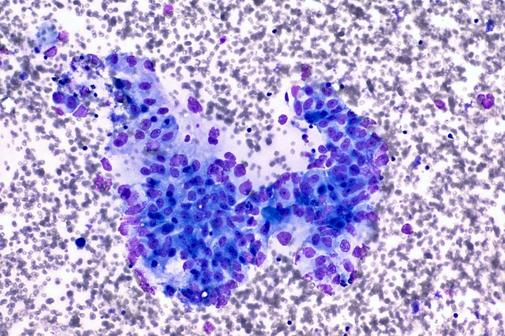- Preliminary study.Barbacid achieves remission of pancreatic cancer in mice
The KRAS gene is one of the most persecuted targets in cancer research. Mutations in that family of genes and proteins are very frequent and are at the origin of one in four cases of cancer. In the case of pancreatic cancer, for example, it is responsible for the appearance of more than 90% of the tumors . Although its existence was discovered more than half a century ago and that more than 35,000 investigations have focused on it, it has not yet been possible to develop a treatment capable of stopping its action once that dangerous genetic anomaly is triggered.
This Wednesday, Nature magazine publishes the details of a promising new treatment directed against the KRAS mutation, which has shown good results in a study on tumors in mice and human patients. The research is the first successful trial of a treatment that applies inhibitors of this mutated gene in humans . Its authors are scientists from the American biotechnology company Amgen and the key is a drug, called AMG 510, capable of stopping the activity of the oncogene. "AMG 510 is the only KRAS inhibitor that is in clinical development," the authors explain. "At the moment we have managed to optimize several inhibitors, using new interactions to improve their potency and selection capacity."
The KRAS gene and the protein it generates are responsible for regulating cell growth. When they mutate and get out of control they can cause excessive cell proliferation that ends up generating the appearance of tumor cells. A simple amino acid substitution is enough to activate this mutation, which appears in between 20% and 30% of cancer cases , especially in those of the pancreas, colorectal and lung. In addition to its role as a generator of malignant cells, the KRAS gene encodes a key signaling protein in tumors, another reason that has made it the protagonist of so many studies.
In Spain, the team led by Mariano Barbacid at the National Oncology Research Center (CNIO) works on an inhibition technique through a complex genetic modification, which they have already successfully tested in mice. However, such a sophisticated genetic editing method is, for the moment, unfeasible for human patients.
Pioneer work
In the research that appears now in Nature the treatment helped reduce, and in some cases eradicate, the tumor in rodents. But it also obtained excellent results in the two human patients, in which what is known as a dose escalation study was carried out; the stage of the investigation in which the optimal and safe dose is sought. After six weeks of treatment the tumor of one of the patients had been reduced by 67%, the other by 34%.
The authors stress that it is a pioneering work in cancer patients who respond to a direct and selective KRAS inhibitor. "In preclinical analyzes, treatment with AMG 510 has not only caused the regression of KRAS tumors but has also improved the antitumor efficacy of chemotherapy and targeted agents," the authors write.
On the other hand, in rodent colorectal cancer experiments the treatment has managed to create a pro-inflammatory microenvironment around the tumors. This means that the tumor is more sensitive for other medications , which generates an adaptive immune response and opens the door to the application of other solutions for patients. These results suggest that the drug could work both administered alone and in combination with other anti-disease strategies. "In addition, the mice that were cured later blocked the growth of KRAS isogenic tumors, which also suggests an adaptive immunity against antigens," the scientists add.
According to the criteria of The Trust Project
Know more- Science and Health
InterviewMichel Mayor: "In 10 years we will have candidate planets to seek life"
The land of Brazil is filled with mysterious oil stains
Nobel Prize in Chemistry for parents of lithium batteries

